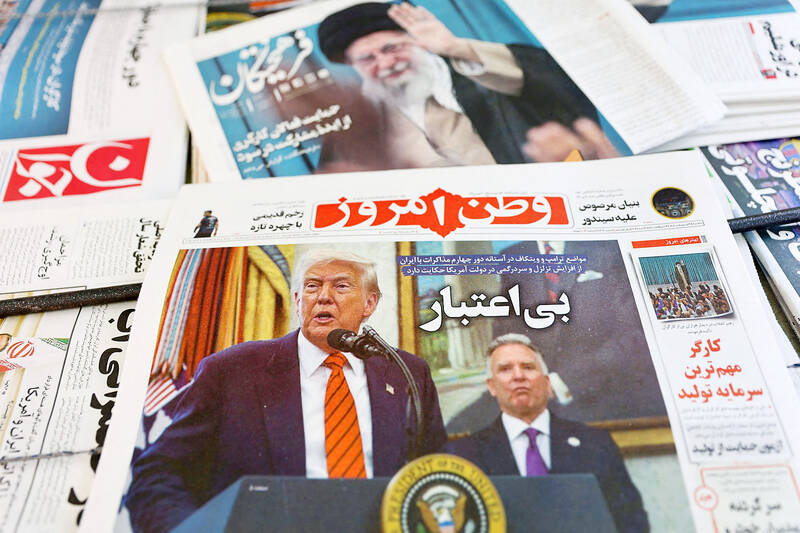Top Iranian and US negotiators resumed talks yesterday to address disputes over Tehran’s nuclear program, Iranian state media reported, in a push for progress as Washington hardens its stance ahead of US President Donald Trump’s Middle East visit.
Although Tehran and Washington have said they prefer diplomacy to resolve the decades-long dispute, they remain deeply divided on several red lines that negotiators would have to circumvent to reach a new nuclear deal and avert future military action.
Iranian Minister of Foreign Affairs Abbas Araqchi and US Special Envoy to the Middle East Steve Witkoff are holding the fourth round of talks in Muscat through Omani mediators, despite Washington taking a tough stance in public that Iranian officials said would not help the negotiations.

Photo: West Asia News Agency via REUTERS
Before departing for Muscat, Araqchi told Iranian state TV that “Iran has well-known positions based on clear principles ... We hope to reach a decisive stance in Sunday’s meeting.”
He added that Iran’s expert team was in Oman and “will be consulted if necessary.”
Witkoff told Breitbart News on Thursday that Washington’s red line is: “No enrichment. That means dismantlement, no weaponization,” requiring the complete dismantling of Iran’s nuclear facilities in Natanz, Fordow and Isfahan.
“If they are not productive on Sunday, then they won’t continue and we’ll have to take a different route,” Witkoff said about the talks.
Trump, who has threatened military action against Iran if diplomacy fails, is to travel to Saudi Arabia, Qatar and the United Arab Emirates from tomorrow to Friday.
Reacting to Witkoff’s comments, Araqchi said on Saturday that Iran would not compromise on its nuclear rights, which includes uranium enrichment.
Tehran is willing to negotiate some curbs on its nuclear work in return for the lifting of sanctions, but ending its enrichment program or surrendering its enriched uranium stockpile are among “Iran’s red lines that could not be compromised” in the talks, Iranian officials said.
A senior Iranian official close to the negotiating team said that US demands for “zero enrichment and dismantling Iran’s nuclear sites would not help in progressing the negotiations.”
“What the US says publicly differs from what is said in negotiations,” the official said on condition of anonymity.
He said matters would become clearer at the talks yesterday, initially planned for May 3 in Rome, but postponed due to what Oman described as “logistical reasons.”
Moreover, Iran has flatly ruled out negotiating its ballistic missile program and the clerical establishment demands watertight guarantees Trump would not again ditch a nuclear pact.
Trump, who has restored a “maximum pressure” campaign on Tehran since February, exited Tehran’s 2015 nuclear pact with six world powers in 2018 during his first term and re-imposed tough sanctions that have devastated Iran’s economy.
Iran, which has long said its nuclear program is peaceful, has breached the 2015 pact’s nuclear curbs since 2019, including “dramatically” accelerating its enrichment of uranium to up to 60 percent purity, close to the level of about 90 percent that is weapons-grade, the International Atomic Agency said.

DEFENDING DEMOCRACY: Taiwan shares the same values as those that fought in WWII, and nations must unite to halt the expansion of a new authoritarian bloc, Lai said The government yesterday held a commemoration ceremony for Victory in Europe (V-E) Day, joining the rest of the world for the first time to mark the anniversary of the end of World War II in Europe. Taiwan honoring V-E Day signifies “our growing connections with the international community,” President William Lai (賴清德) said at a reception in Taipei on the 80th anniversary of V-E Day. One of the major lessons of World War II is that “authoritarianism and aggression lead only to slaughter, tragedy and greater inequality,” Lai said. Even more importantly, the war also taught people that “those who cherish peace cannot

STEADFAST FRIEND: The bills encourage increased Taiwan-US engagement and address China’s distortion of UN Resolution 2758 to isolate Taiwan internationally The Presidential Office yesterday thanked the US House of Representatives for unanimously passing two Taiwan-related bills highlighting its solid support for Taiwan’s democracy and global participation, and for deepening bilateral relations. One of the bills, the Taiwan Assurance Implementation Act, requires the US Department of State to periodically review its guidelines for engagement with Taiwan, and report to the US Congress on the guidelines and plans to lift self-imposed limitations on US-Taiwan engagement. The other bill is the Taiwan International Solidarity Act, which clarifies that UN Resolution 2758 does not address the issue of the representation of Taiwan or its people in

The Philippines yesterday criticized a “high-risk” maneuver by a Chinese vessel near the disputed Scarborough Shoal (Huangyan Island, 黃岩島) in a rare incident involving warships from the two navies. The Scarborough Shoal — a triangular chain of reefs and rocks in the contested South China Sea — has been a flash point between the countries since China seized it from the Philippines in 2012. Taiwan also claims the shoal. Monday’s encounter took place approximately 11.8 nautical miles (22km) southeast” of the Scarborough Shoal, the Philippine military said, during ongoing US-Philippine military exercises that Beijing has criticized as destabilizing. “The Chinese frigate BN 554 was

The number of births in Taiwan fell to an all-time monthly low last month, while the population declined for the 16th consecutive month, Ministry of the Interior data released on Friday showed. The number of newborns totaled 8,684, which is 704 births fewer than in March and the lowest monthly figure on record, the ministry said. That is equivalent to roughly one baby born every five minutes and an annual crude birthrate of 4.52 per 1,000 people, the ministry added. Meanwhile, 17,205 deaths were recorded, resulting in a natural population decrease of 8,521, the data showed. More people are also leaving Taiwan, with net